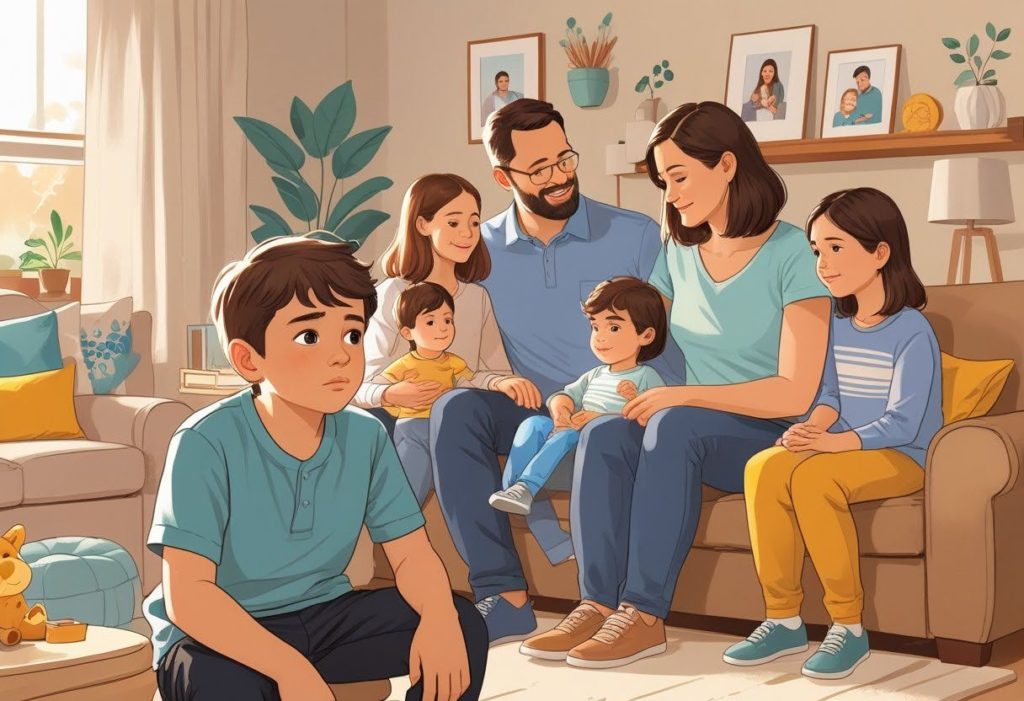In the journey of adoption, the focus often gravitates towards the adopted child, eclipsing the experiences of biological children within the family. This dynamic can create unforeseen emotional challenges for these siblings, who might feel sidelined as attention shifts. Bryan Post, a renowned expert in child behavior and adoption, emphasizes the importance of understanding and addressing the emotional needs of all children in blended adoptive families.

Bryan Post provides invaluable insights into fostering a balanced family environment where each child’s emotional landscape is recognized and supported. He advocates for trauma-informed parenting approaches that not only cater to adopted children but also consider the silent struggles of the biological ones. These strategies ensure that every child feels heard and valued in the family unit.
By incorporating tools and techniques tailored to address complex family dynamics, Bryan Post encourages adoptive parents to create inclusive spaces for dialogue. This approach helps mitigate feelings of neglect or resentment, fostering a harmonious home environment conducive to the well-being of all its members. Practical steps and empathetic communication stand at the core of Bryan’s methods, making them vital for families navigating the intricate dynamics of adoption.
Understanding Trauma-Informed Support for Biological Children
Adoption can significantly impact the emotional landscape of biological children within blended families. Specific strategies help address these challenges, ensuring the emotional well-being of every child in the home. Bryan Post, known for his work in trauma-informed care, provides valuable insights into these dynamics.
The Overlooked Emotional Impact of Adoption on Siblings
Biological children often face unique emotional challenges when a new sibling is adopted into the family. The attention and focus typically shift towards the adopted child, which may leave them feeling sidelined. This shift can provoke feelings of jealousy, confusion, and a sense of being overshadowed.
Not acknowledging these emotions can lead to deeper conflicts and misunderstandings among siblings. It’s crucial for parents to openly discuss these issues with their biological children, addressing their fears while fostering a supportive family environment.
Bryan Post’s Approach to Addressing Emotional Needs
Bryan Post emphasizes the importance of creating an inclusive emotional space for both adopted and biological children. He advocates for trauma-informed strategies that recognize the distinct needs and feelings of each child in the family.
Tools like active listening, emotional validation, and family counseling can be instrumental in managing these dynamics. Post’s methods aim to ensure that every child’s voice is heard, promoting harmony and understanding within the family unit.
He also encourages parents to spend individualized quality time with each child, reinforcing their unique role in the family.
Challenges Faced by Biological Children in Blended Adoptive Families
Biological children may encounter several challenges in blended adoptive families, including role confusion and competition for parental attention. They might struggle with adapting to the new family dynamic, impacting their sense of security and belonging.
These children may also experience internalized pressure to act as role models for their new siblings. Parents must be aware of these challenges and provide consistent emotional support. It’s vital to assure them of their irreplaceable place within the family while acknowledging the complexities adoption brings.
Building strong communication channels and reinforcing inclusivity can help mitigate these challenges effectively.
Implementing Bryan Post’s Tools for Balanced Family Dynamics
Family dynamics in adoptive homes are often complex, particularly when blending the needs of biological children with those of their adopted siblings. Bryan Post offers a trauma-informed framework that not only supports adopted children but also provides strategies to help biological siblings feel secure, heard, and emotionally connected. His approach focuses on fostering open communication, resilience, and emotional safety across the entire family system.
These principles are brought to life through the From Fear to Love World Tour—a nationwide series of live workshops where Bryan Post guides families through his model in a hands-on, supportive setting. At each stop, including the upcoming Memphis event on May 20, attendees explore practical ways to apply trauma-informed strategies that strengthen both individual relationships and overall family balance.
Creating Space for Every Child’s Voice
Bryan Post emphasizes that healing doesn’t just happen for one child—it must happen within the entire family system. One of the foundations of his approach is ensuring every child in the home feels heard. This includes creating structured opportunities for expression, such as regular family meetings, individual check-ins, or family journals. These tools offer safe spaces for children to share their emotions and experiences—away from sibling pressures or household distractions. By validating each child’s voice, families promote inclusion and trust, both key components of long-term emotional stability.
Building Emotional Resilience in Biological Siblings
Biological siblings may face unexpected emotional challenges when adoption reshapes family dynamics. Bryan Post’s trauma-informed approach encourages parents to be proactive in building these children’s resilience. Techniques like mindfulness, role-playing, and participation in sibling support groups offer concrete ways to help biological children process feelings of confusion, jealousy, or displacement. These strategies are explored in detail during the From Fear to Love tour, where parents receive real-time guidance and community support to better meet the needs of every child in the household.
Fostering Healthy Communication Between All Family Members
Effective communication is key to maintaining harmony within adoptive families. Bryan Post advocates for open and honest dialogue that respects each child’s perspective.
Active listening skills are essential, where parents model attentive listening to reinforce its importance. Setting up communication norms can facilitate smoother interactions, ensuring conflicts are handled constructively.
Encouraging empathy encourages children to understand and consider the feelings of their siblings. Family story circles can be a fun and interactive way to improve communication, where everyone shares something about their day or a story, promoting connection and understanding.
By incorporating these communication-enhancing strategies, families can nurture understanding and strengthen their bonds.
